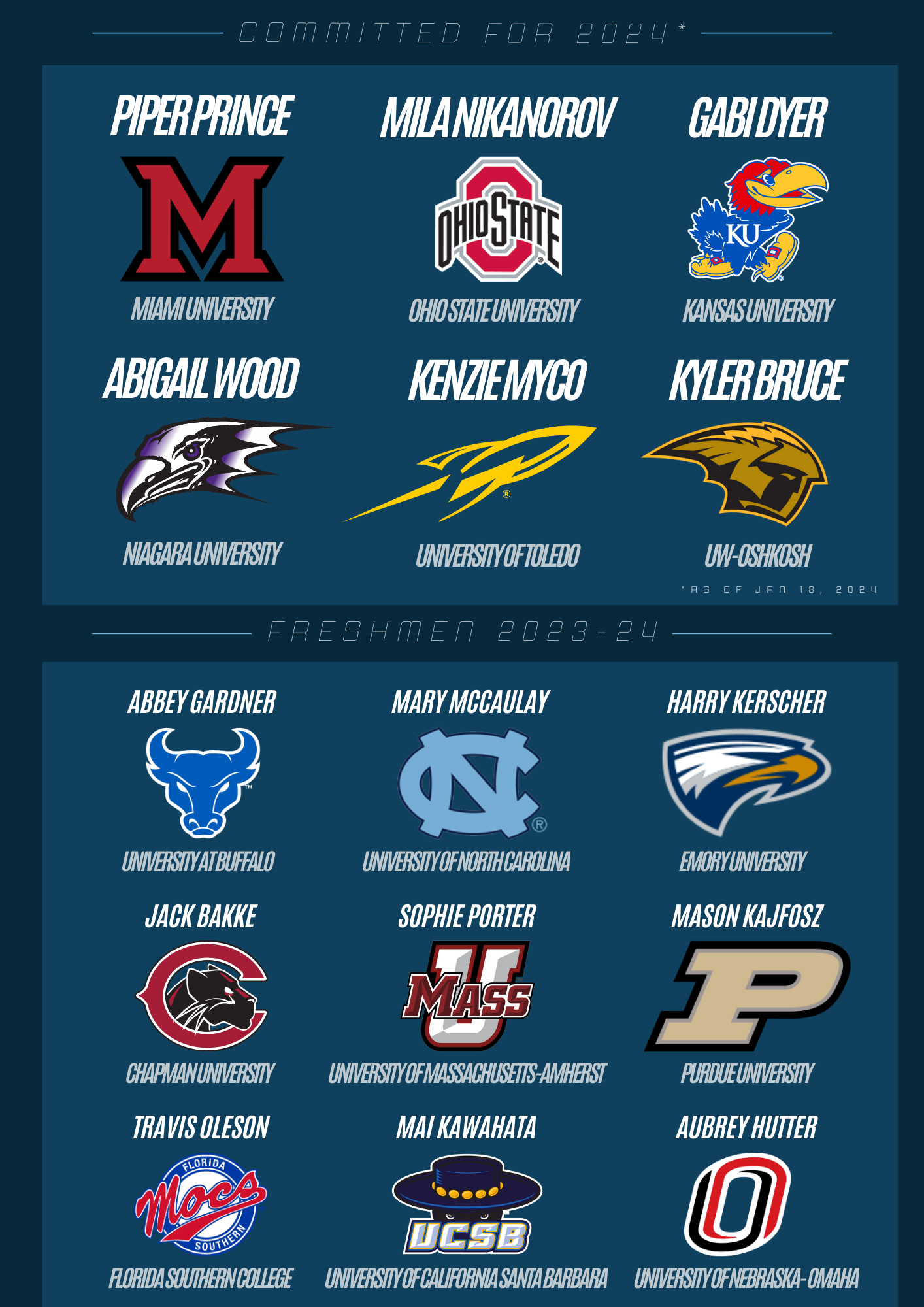
There is often a misconception in the college search process that if you are not recruited or have not been offered a scholarship you must not be very good. That view is completely false. The fact is that most colleges just do not have the finances available to offer every good swimmer a scholarship. Another fact is that most colleges do not find out a student-athlete is interested in their program until that student has made "First Contact."
Many families assume that colleges are going to call them first. The reality is that most collegiate swimming programs do not have the manpower to search for athletes. Most coaches rely on meet results from large meets such as Sectionals or High School State, USA Club coaches, prospective student questionnaires, and through professional recruiters (not sports agents) whom student-athletes pay a fee to have them send information to schools about them.
With the scholarship limits that are imposed by the NCAA, most college coaches are going to be looking at a student’s academic ability. The vast majority of swimming student athletes receives financial aid through academic related scholarships, grants and student loans, not through athletic scholarships.
Athletic Scholarship
An athletic scholarship is a one-year contract between you and a Division I or Division II institution. A school can reduce or cancel a scholarship if you become ineligible for competition, fraudulently misrepresent yourself, quit the team or engage in serious misconduct. During the contract year, a coach cannot reduce or cancel your scholarship on the basis of your athletic ability, performance, or injury. An institution may choose to not renew a scholarship at the end of the academic term provided they notify you in writing and provide you an opportunity for a hearing.
Remember a coach cannot offer you a "four year full-ride scholarship." They do not exist. Each student athlete award is reviewed annually. It is important to ask current collegiate swimmers if they are still on scholarship. Parents, it is not uncommon for a college program to offer and renew an athletic scholarship for the first 2-3 years of college and then ask the student to pay full tuition for the remainder of their college career.
National Letter of Intent
The National Letter of Intent is administered by the Collegiate Commissioners Association (not the NCAA). When you sign the National Letter of Intent you agree to attend the institution with which you signed for one academic year in exchange for the institution awarding financial aid, including athletics aid, for one academic year.
Hosting a recruit requires a great deal of work for the host, the team and the coaches. Be interested, open-minded and ask questions. If you don’t seek out “food for thought” then don’t be unhappy with what you are served.
Evaluate Don’t Anticipate
Unfortunately, drinking occurs on many college campuses. Don’t be shocked by it, but don’t be pressured by it either. If you don’t drink, let your host know as soon as possible. What a team tolerates from its members will give you a good indication of where it is headed. If a team tolerates the use of recreational drugs by any of its members, it is probably headed nowhere.
A “classy” recruit will send a hand-written thank you to the host, the team and the coaches in appreciation of their effort. Be a “classy” recruit.
Before You Go
Decide what your values are and what you are looking for in a school and an athletic team.
Sit down with your parents and discuss how much you can afford for college, but don’t share this with the coaches at this time.
Academics should be the most important item you are looking at, followed by athletics; however if weather and location are important to you, make sure to do your “homework” before you accept a trip.
Determine your area of academic interest. It’s OK if you can’t decide on a college major right now, but you should begin to narrow down what you are not interested in.
Ask the coach about your student host and try to find out about them before you arrive.
Evaluate don’t anticipate. Make your own list of questions using these tips as a guide, but leave your preconceived ideas at home.
Be prepared to have FUN, but remember to distinguish between what’s fun and what’s important.
Make sure you have the coach’s phone numbers with you so that you can contact them if you get delayed in arriving.
Ask questions! Most importantly…be yourself.
Observations You Need to Make During Your Visit
Is the team close? If it is a combined team, do the men and women support each other?
Are these the kind of people who you can visualize spending the next five years of your life with?
Are the student-athletes checking you out or are they just glad to have someone interested in their school?
If you are a young woman, are the female athletes treated as equals and with respect?
Do you get a sense that you are important as a person or just as an athlete?
Did anyone ask you what your goals are?
Do you feel safe on and around campus?
Do the coaches support each other?
Do the majority of the student-athletes share your views and priorities about academics and athletics?
Do the student-athletes respect the coaches and do they like them?
Scholarship Considerations
Look for value in a school and a program, not just money. It is far more important to find the right school and not just the cheapest.
A team’s needs change from year to year and as they answer those needs their scholarship priorities change.
Grades count. Coaches don’t want to waste their time and money on an athlete who is an academic risk.
Leadership qualities count, but don’t list them ahead of academic and athletic accomplishments.
Most scholarships are given to student-athletes who can help the team at the conference and national level.
Athletic versatility makes you more marketable.
Present yourself as a “big game” performer.
If you are a minority, let the coaches know. There is a lot of extra financial aid available for minorities.
Don’t be concerned with other athletes’ scholarships. Each recruiting situation is different.
Ask the coaches what their policies are on:
Fifth year scholarships. Coaches are allowed to give student-athletes financial aid in their fifth year of school even though the student-athlete can no longer compete for the school. This scholarship does not count against the scholarship limit for that sport.
Summer school. The NCAA allows schools to award summer school scholarships to current student-athletes at the same percentage of scholarship they were on during the regular school year.
Scholarship upgrades. What does it take to get an increase in scholarship?
Scholarship downgrades. What are reasons for having a scholarship downgraded?
The bottom line is what does it cost to attend a school and how much will it cost you.
Questions to Ask of the Student-Athletes
Be sure to get some of the student-athletes aside and away from the social gatherings and get them to talk openly and honestly about the program.
If your student host is a freshman don’t rely too heavily on their assessment of the school and the program. Some freshmen are homesick and temporarily unhappy and some have their head in the clouds. They simple haven’t been there long enough to be able to evaluate the situation.
Seek out any 5th year student-athletes and ask the following questions:
Did they receive 5th year aid?
Did they improve since their freshman year?
Were they encouraged to remain part of the program? A sign of a good program is the number of 5th year student-athletes who remain involved in the program.
Ask them to rate their overall experience at the school.
Try to find out some of the individual goals and some of the team goals.
Are the academic counselors effective?
Ask some of the same questions that you asked the coaches to determine if the student-athletes feel as they do.
Get their opinion of the coaching staff.
What is the city or town like?
What do they do for fun?
Are the student-athletes being themselves or are they putting on a show?
Enjoy yourself….you should feel honored to be invited on an official visit.
Finding out if you have what it takes to compete in swimming at the college level is easy, and many swimmers do have the potential considering all of the options.




